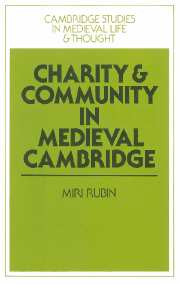Book contents
- Frontmatter
- Contents
- List of tables
- Acknowledgements
- List of abbreviations
- Map
- 1 INTRODUCTION
- 2 THE ECONOMIC BACKGROUND: SUPPLY AND DEMAND FOR CHARITY
- 3 THE IDEA OF CHARITY BETWEEN THE TWELFTH AND FIFTEENTH CENTURIES
- 4 THE CHARITABLE HOUSES OF MEDIEVAL CAMBRIDGE AND ITS SURROUNDINGS
- 5 LIFE IN A MEDIEVAL HOSPITAL: THE HOSPITAL OF ST JOHN, CAMBRIDGE
- 6 THE RELIGIOUS AND ECONOMIC FUNCTIONS OF THE HOSPITAL OF ST JOHN
- 7 CORPORATE AND INDIVIDUAL ACTS OF CHARITY
- 8 EPILOGUE
- Appendix 1 The rule of the hospital of St John the Evangelist, Cambridge
- Appendix 2 The list of masters of the hospital of St John the Evangelist, Cambridge (c. 1207–1507)
- Bibliography
- Index
5 - LIFE IN A MEDIEVAL HOSPITAL: THE HOSPITAL OF ST JOHN, CAMBRIDGE
Published online by Cambridge University Press: 28 October 2009
- Frontmatter
- Contents
- List of tables
- Acknowledgements
- List of abbreviations
- Map
- 1 INTRODUCTION
- 2 THE ECONOMIC BACKGROUND: SUPPLY AND DEMAND FOR CHARITY
- 3 THE IDEA OF CHARITY BETWEEN THE TWELFTH AND FIFTEENTH CENTURIES
- 4 THE CHARITABLE HOUSES OF MEDIEVAL CAMBRIDGE AND ITS SURROUNDINGS
- 5 LIFE IN A MEDIEVAL HOSPITAL: THE HOSPITAL OF ST JOHN, CAMBRIDGE
- 6 THE RELIGIOUS AND ECONOMIC FUNCTIONS OF THE HOSPITAL OF ST JOHN
- 7 CORPORATE AND INDIVIDUAL ACTS OF CHARITY
- 8 EPILOGUE
- Appendix 1 The rule of the hospital of St John the Evangelist, Cambridge
- Appendix 2 The list of masters of the hospital of St John the Evangelist, Cambridge (c. 1207–1507)
- Bibliography
- Index
Summary
Throughout the survey of charitable foundations in medieval Cambridgeshire a diverse picture of forms and activities has emerged. Their complex and flexible character can be appreciated further from the structure and orientation of their institutional lives and services. Therefore, we turn now to the urban hospital of Cambridge for a study in depth of one such institution bearing in mind that its character reflected changes in society's attitudes towards and expectations of a house of mercy.
HOSPITALS AND THE ATTITUDES
TOWARDS PHYSICAL HEALING
Pauper et infirmus is the commonplace description of those intended to benefit from charitable giving. Some sick people were necessarily poor, not only through their loss of working capacity, but, as in the case of lepers, through being prohibited from holding property. Some types of sickness were seen as punishment for sin, and imposed on the sick a double stigma. Yet it is usually in vain that one searches for medical orientation in the activities of institutions devised for the relief of the sick and poor. Although medicine was studied in medieval universities, on a practical level healing was not seen primarily as a purely physical transformation; if sickness was caused by sin, it was to be remedied by conquering sin. A wide range of measures was taken to induce spiritual healing, traditional practices were employed and expected to work transformations in the patient's psyche. The formal dichotomy of medicine/healing is manifested in twelfth- and thirteenth-century synodal legislation which reiterated the need for spiritual balm to counteract the sinful state which causes physical ailment, a view clearly stated in the Decretum, ‘contraria sunt divine conditioni precepta medicine’ (‘the principles of medicine are contrary to divine command’).
- Type
- Chapter
- Information
- Charity and Community in Medieval Cambridge , pp. 148 - 183Publisher: Cambridge University PressPrint publication year: 1987



